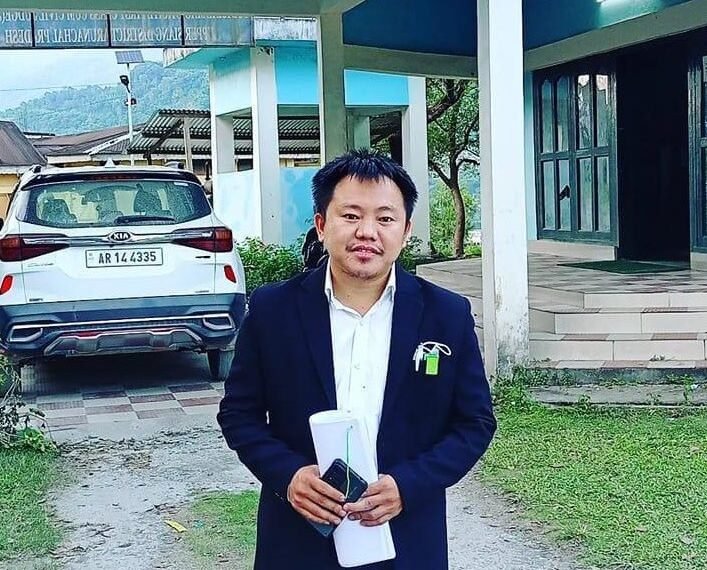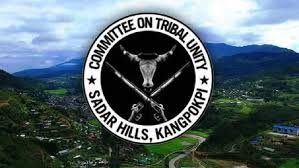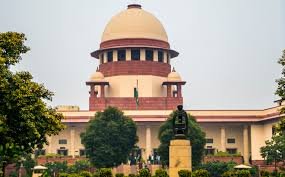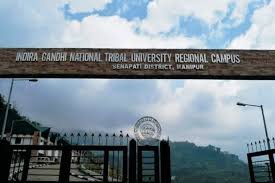Human rights defender Ebo Mili, legal advisor to the Siang Indigenous Farmers’ Federation, reappeared after days of being missing. He stated he was forced to leave his village due to safety concerns following a police complaint related to his alleged involvement in a peaceful protest against the controversial Siang dam project on the Siang River (India’s Brahmaputra).
BY PC Bureau
Human rights defender and anti-mega dam activist Ebo Mili, also a legal advisor for the Siang Indigenous Farmers’ Federation (SIFF), has reappeared several days after he went missing from Parong village in Arunachal Pradesh. Mili stated in a Friday release that he was compelled to leave the village for his own safety and that of the residents after a police complaint was filed against him by PN Thungon, the Deputy Commissioner of Boleng.
Mili’s disappearance occurred against a backdrop of increasing tensions in the Upper Siang and Siang districts due to the deployment of armed personnel for the proposed 12,000 MW Siang Upper Multipurpose Project. He explained that he was traveling towards Shi-Yomi when a landslide in the Tato area caused him to be stranded. Seeking shelter at a GREF (General Reserve Engineer Force) camp, he kept his mobile phone switched off to avoid potential police surveillance.
READ: Arunachal Protests Erupt Over Siang Mega-Dam Project
According to Mili, multiple roadblocks prolonged his journey. By the time he reached an area with network connectivity, reports of his disappearance had already been circulating. He expressed his gratitude to fellow activist Bhanu Tatak and local villagers for their efforts in pressuring authorities, which he believes prevented his arrest despite the complaint lodged against him.
The police complaint against Mili reportedly stemmed from his alleged leadership of a group of 80–90 people during a peaceful protest in Beging village on May 22. Beging village has become a focal point of resistance against the proposed dam project. However, local villagers maintain that Mili was present solely in his legal capacity with SIFF and did not incite any unlawful activity during the demonstration.
Ebo Mili, a lawyer, environmental & human rights defender has been missing since 26th May, 6:20pm. They’re also being accused of “leading a mob” for exercising their democratic right to peaceful protest. Yet another example of shrinking democratic space and repression of dissent pic.twitter.com/hm9Wkj0ukC
— Disha Ravi 🇵🇸𓆉 (@disharavii) May 27, 2025
READ: Trump Embarrasses India Again, Puts Modi and Pak Leadership on Same Pedestal
The protest at Beging involved over 400 indigenous villagers who are opposing the NHPC (National Hydroelectric Power Corporation)-led dam project on the Siang River. The Siang River is the Indian name for the Yarlung Tsangpo, a major river on which China is planning to construct the world’s largest hydroelectric dam. The Indian government views its own dam project as a strategic countermeasure. However, critics argue that this project will come at the cost of indigenous rights and the region’s ecological integrity.
Following the protest, authorities invoked Section 144 of the Code of Criminal Procedure (CrPC) to prohibit public assemblies, a move widely criticized as suppressive. Notices were also issued to village heads and government employees who participated in the protest, citing violations of the Central Civil Services (Conduct) Rules, 1964.
READ: Will Modi Tap Tharoor to Lead India’s Foreign Policy?
Human rights watchdog FORUM-ASIA has condemned the retaliatory actions against Mili and others involved in the protest. Mary Aileen Diez-Bacalso, the Executive Director of FORUM-ASIA, called for an end to such reprisals and urged the government to ensure that activists can operate without facing harassment, detention, or violence.
The organization further warned that the proposed dam project poses a significant threat to critical wildlife habitats, including those of endangered species such as the Bengal tiger and the Asian elephant. FORUM-ASIA also accused the Indian government of failing to obtain free, prior, and informed consent from the affected Adi community, who hold the Siang River as sacred and depend on it for their livelihoods.













